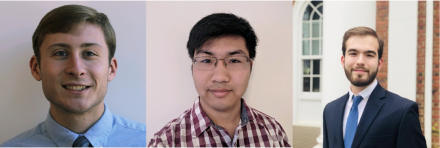Students applied their economics, data analysis and presentation skills in the competition, consulting for non-profit organization Seed Effect.
The Elon Microfinance Challenge, hosted by the Elon Microfinance Initiative (EMI) and the Department of Economics, provided students with an opportunity to apply their coursework in a real-world consulting experience.

During the course of three weeks in April, student teams analyzed proprietary data for Seed Effect, a nonprofit organization providing microfinance opportunities to South Sudanese refugees and Ugandans, to assess the impact of the microfinance initiative and offer recommendations to the organization.
In preparing their analyses, teams were allowed to seek the guidance and ask questions of Steve DeLoach, the Martha and Spencer Love Professor and chair of the Department of Economics, and Tonmoy Islam, assistant professor of economics and EMI faculty advisor.
“EMI wanted to host this challenge to expose the student body to a real-world data analysis scenario,” said Lily Friel ’22, president of EMI. “We believe it is important for students of all majors to be able to analyze complex data and draw informative conclusions. This is becoming a crucial skill that many employers are seeking and we, as an organization, wanted to provide students an opportunity to showcase this skill in fun, academically rewarding way.”
Due to the COVID-19 pandemic, the challenge shifted to a virtual format with teams working remotely to analyze the data and prepare their presentations. Teams submitted video presentations for Seed Effect to review.

“Due to COVID-19, students faced some additional hurdles in completing their work,” Islam explained. “They couldn’t meet with their group members face-to-face, they couldn’t present their findings in-person, and they had to coordinate their data analyses and presentations remotely. In spite of all these hurdles, the students did a fantastic job! They incorporated their knowledge from different majors to analyze the data and present their results. I am very happy to see the professionalism the students showed in their presentations.”
Adam Behrman ’20, a computer science major, Ryan Kelleher ’20, a psychology major, and Steven Mei ’20, a finance and computer science double major, won the interdisciplinary competition.
The team of Andrew Harper ’22, an economic consulting and finance double major, Savannah Josey ’23, a first-year Business Fellow, and Maxwell Zucker ’21, an economics major, placed second.
“I really enjoyed getting to apply many of the statistical analysis programs I learned about in my economics and finance classes, including the use of R, Stata and Tableau, to real-world problems and finding some really significant connections,” Zucker said. “Especially in the face of COVID-19, the Microfinance Challenge was a welcoming retreat from a lot of the chaos.”
“This challenge taught me the importance of communicating your strengths, as we all came into this project with different skillsets and interests, but together we were able to draw conclusions that independently we wouldn’t have discovered,” Josey added. “It was a challenging few weeks working through the data, but learning how to tackle a large task with a team equipped with different perspectives was invaluable.”

Seed Effect evaluated the presentations on the teams’ analysis of the impact of its village savings and loan programs on South Sudanese refugee households in Uganda and the teams’ ability to help Seed Effect convert the impact of their programs to potential donors to support the organization’s work.
“Across the board, I was impressed by the teams’ willingness to fully invest in the challenge,” said Grace O’Hara ’18, project manager at Seed Effect and an Elon alumna. “From performing background research in developing their understanding, to creating meaning during data analysis, to the culmination of the two in thoughtful, compelling presentations that had the feel of micro-consulting projects. I was encouraged by their dedication and excited by the varying interpretations of analysis communicated during the challenge!”
“This was a very valuable experience for us in that it provided a real problem and real data for us to work with,” Behrman said. “Our biggest takeaway from the challenge is the impact we can all have. With even just small contributions, we can help charities such as Seed Effect provide critical support for those who need it most.”


